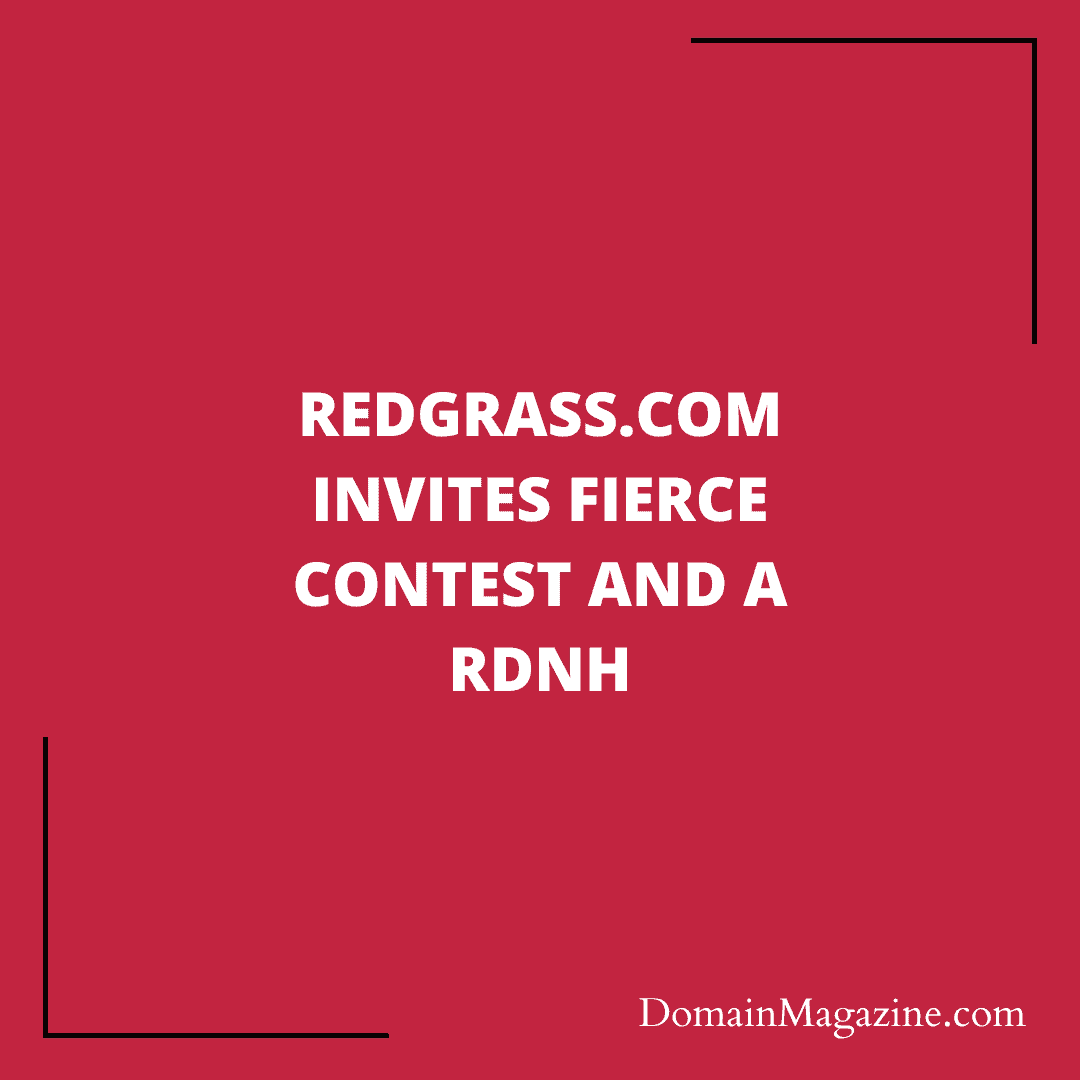Today we are going to discuss a UDRP case surrounding the domain name RedGrass.com. The Complainant, Redgrass SA, is a Swiss company that sells miniature paintings and holds various trademark registrations for the brand “Redgrass” in multiple jurisdictions. The Respondent is a domain name reseller who owns a large portfolio of domain names, including many that begin with “red” and end with a plant species, as well as many that end with “grass”.

The disputed domain name was created in 1999 and was acquired by the Respondent in June 2017. The domain name currently resolves to the Respondent’s website and is advertised for sale for USD 14,095. The Complainant claims that it should legitimately own the domain name but is unable to move forward with its project due to the Respondent’s passive holding and the high sale costs imposed by the Respondent.
The Parties have exchanged emails regarding the sale of the domain name, with the Complainant offering to buy the domain for USD 3500 and the Respondent making a counter-offer of USD 13,995 or a payment plan based on the list price.
Complainant’s Case
The Complainant argues that they hold prior rights in the trademarks REDGRASS and REDGRASSGAMES, and that the disputed domain name is identical to their protected sign REDGRASS and highly similar to their protected sign REDGRASSGAMES. They also claim that the Respondent has no legitimate rights or interests in the disputed domain name, as they have been passively holding it since 2017 without any evidence of active use in the market, and their main business is reselling domain names without offering goods or services.
The Complainant further argues that the Respondent’s passive holding of the disputed domain name for five years, without any use in the market, is unjustified and constitutes bad faith. They assert that the Respondent registered the disputed domain name solely for the purpose of reselling it for valuable consideration in excess of documented out-of-pocket costs, and that the advertised price is far more than the Respondent’s out-of-pocket costs. They also note that the Respondent owns a series of domain names including the suffix “grass”, most of which are on sale at a relatively reasonable price, while the purchase price of the disputed domain name is disproportionate.
The Complainant contends that the name REDGRASS is not generic, but a fanciful sign that can work as an indication of commercial origin of products and services, and that they are the legitimate right holder of trademarks identical and akin to the disputed domain name, extending to Canada, Switzerland, and the United States, as well as additional protection in China dating back to 2019. They argue that the Respondent’s ownership of the disputed domain name prevents them from using it in a fair way for commercialising goods and services in the online market, and that the Complainant is the entity that should legitimately own the disputed domain name.

Respondent’s Rebuttal
The Respondent argues that they acquired the disputed domain name more than three years before the Complainant applied for its first trademark application. They claim that the Complainant does not have exclusive worldwide rights to the term “redgrass” and did not have any registered trademark rights for it in June 2017 when the Respondent registered the disputed domain name. The Respondent also argues that “redgrass” is a generic term used by hundreds of businesses, organisations, and individuals and is defined in the Merriam-Webster Dictionary as a type of southern African grass.
The Respondent claims to have legitimate interests in the disputed domain name, stating that they are a reseller of generic and descriptive domain names and that selling generic domain names is a legitimate business practice. They also argue that they are using the disputed domain name in connection with a bona fide offering of goods and services, and that they are not required to operate an active website or to offer goods that bear the mark corresponding to a domain name.
The Respondent denies any bad faith registration or use of the disputed domain name, stating that they had never heard of the Complainant until contacted in February 2021 and that they did not target the Complainant or its business in any way. They also argue that the Complainant’s annexes lack evidence to support their claims and that the Complainant’s sole basis for filing the Complaint is to obtain a domain name that they could not purchase through negotiation.
Finally, the Respondent accuses the Complainant of filing a bad faith complaint in abuse of the UDRP, stating that the Complainant knew or should have known that they were unable to prove that the Respondent lacks rights in the disputed domain name.
Jury’s Judgement
The panel found that the complainant failed to establish that the respondent registered and used the disputed domain name in bad faith, which is a requirement under the third element of paragraph 4(a) of the Uniform Domain Name Dispute Resolution Policy (UDRP).
Regarding the first element, the panel found that the disputed domain name is identical to the REDGRASS trademark and confusingly similar to the REDGRASSGAMES trademark, in which the complainant has established rights. However, the complainant’s rights in the trademarks did not exist at the time of the registration of the disputed domain name by the respondent.
Regarding the second element, the panel did not find it necessary to evaluate whether the respondent had any rights or legitimate interests in the disputed domain name given the finding on the third element.

Regarding the third element, the panel found that the complainant failed to establish that the respondent registered and used the disputed domain name in bad faith. The respondent acquired the disputed domain name more than two years before the earliest registration of any of the complainant’s trademarks, and the complainant did not establish that it held any unregistered trademark rights at the time of the respondent’s acquisition of the disputed domain name.
Therefore, the panel concluded that the complainant failed to establish bad faith registration and use of the disputed domain name by the respondent.
RDNH
The panel noted that the Complaint suffered from a serious defect regarding the timing of the accrual of the Complainant’s trademark rights, and the Respondent had given the Complainant full notice of the timing of its acquisition of the disputed domain name and its position on the merits of the case over a year before the filing of the Complaint. The Panel found that the Complainant sought to remedy this defect by reference to two company name registrations and evidence of later events, which the Complainant knew, or should have known, could not succeed under any fair interpretation of the facts.
The Panel further found that the Complaint was motivated by the Complainant’s dissatisfaction with the price of the disputed domain name and the Respondent’s unwillingness to offer a substantial discount. The record indicated that the Complainant resorted to the Policy as “Plan B” in case it failed to gain control over the disputed domain name in the marketplace or to increase its bargaining leverage. The panel concluded that either of these purposes was highly improper for a complaint under the Policy and constituted a further basis to find Reverse Domain Name Hijacking.
Therefore, the Panel declared that the Complaint was brought in bad faith and constitutes an abuse of the administrative proceeding.
You can read the complete case here.


Join the Discussion